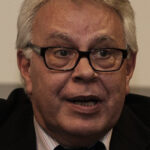Almost six months since the start of the Global Leadership for Haiti´s Reconstruction project, the Club de Madrid has positioned itself before the international community and political, economic and social leaders in Haiti as a neutral arbiter accessible to all; building on this trust, the third high level mission was able to promote the electoral process as a necessary step in stabilizing the country that will bring attention to electoral disputes to concentrate efforts on the process of reconstruction. It is imperative that the legislative and executive authorities that emerge on March 20 possess the legitimacy necessary to permit them to create an institutional framework in which political, social, religious and economic actors can generate the agreements necessary to guarantee the governability of the country, a key element of the full implementation of the reconstruction process.
The Club de Madrid has formally requested that the European Union and the Organization of American States strengthen international observation of the upcoming March 20 elections as a vital guarantee to increase the legitimacy of the results.
Governance is doubly relevant; as a final result, citizens have to be participants in the benefits of good governance through public services and institutions that respond to their needs; and as a means to an end, good governance allows those countries with predictable decision making processes to be more attractive to investors and to generate more economic development.
Felipe González – Former President of Spain
The Club de Madrid´s delegation conducted working meetings with representatives of the International community, prominent opposition leaders, religious leaders, the mayor of Port-au-Prince, representatives of the business world, Haitian and international non-governmental organizations, and a group of former Prime Ministers of Haiti including Chérestal, Maval, and Smarth. The delegation participated in an informational meeting with the Interim Commission for the Reconstruction of Haiti, through which working meetings with presidential candidates Myrlande Manigat and Michel Martelly and with President Clinton, co-President of the Commission and member of the Club de Madrid, were conducted. In Santo Domingo, during their respective trips to and from Haiti, both President González and Prime Minister Jospin had working meetings with President Fernández of the Dominican Republic, also a member of the Club de Madrid. Finally, the delegation met privately in long working sessions with President Préval and Prime Minister Bellerive, where both heads of state discussed the immediate future of the electoral process and, in much greater detail, the necessity of consensus and the institutional strengthening of the country.
The delegation was pleased to verify that Haiti is regaining normality little by little; the camps of displaced persons appear less overcrowded, less debris can be seen on the streets of Port-au-Prince and the streets of the capital have regained the frenetic activity they possessed prior to the earthquake on January 12, 2010. Nevertheless, the reconstruction process does not appear to be operating at its full potential. Electoral conflict and uncertainty about the political future of the country put the implementation of the reconstruction plan, previous successes and the very stability of the country at risk.
Key themes for the future of Haiti identified during the mission include, among others:
- Constitutional Reform: As established by the Constitution itself, its reform should be implemented by the coming parliament before the swearing in of the president, leaving a three week window of opportunity from the start of the new legislature to the swearing in of the new president in which to pass constitutional amendments agreed to in regard to dual citizenship and changes in the electoral calendar.
- Political and administrative decentralization to implement the 1987 constitutional provisions
- Strengthening political parties and parliamentary groups as well as parliamentary procedures: The stabilization of Haiti, the development of the reconstruction process and the very stability of the country will require an efficient legislative branch with the capacity to offer solutions to the necessities of the people, as well as a system of political parties able to channel popular demands.
- Socio-economic environment: The reconstruction of Haiti will only become possible with the recuperation of business and economic activity in the country, and to achieve this it is necessary to have an efficient regulatory environment with favourable fiscal policy, customs, judicial security, and penitentiary policy and the judiciary, etc.
- Future of the Working Commission on Reconstruction: Within a few months of the fulfilment of its mandate –which could be prolonged another 18 months- and once the strengths and weaknesses of its functioning are identified, it is necessary to establish the structure and procedures of the Commission so that through the development of its functions it strengthens the Haitian institutions that will have to continue its work once its mandate is complete.
- Creation of a national political consensus in favour of governance: All parties consulted agree on the necessity of creating a national agreement with a broad political, economic and social base that will guarantee the stability vital to advance the reconstruction process, provide Haitian citizens with services and offer them goods that will permit them to reconstruct their lives following the catastrophe of January, 2010.
- Future of the United Nations Mission: The gradual stabilization of the country will necessarily open a debate about the gradual transfer of the functions exercised by the United Nations mission to competent Haitian authorities, a transfer that it is necessary to prepare and plan for in advance.
The Club de Madrid plans to concentrate the efforts of its coming missions on these last three matters, where its added value, the political experience of its members and its convening capacity can be most effective.
